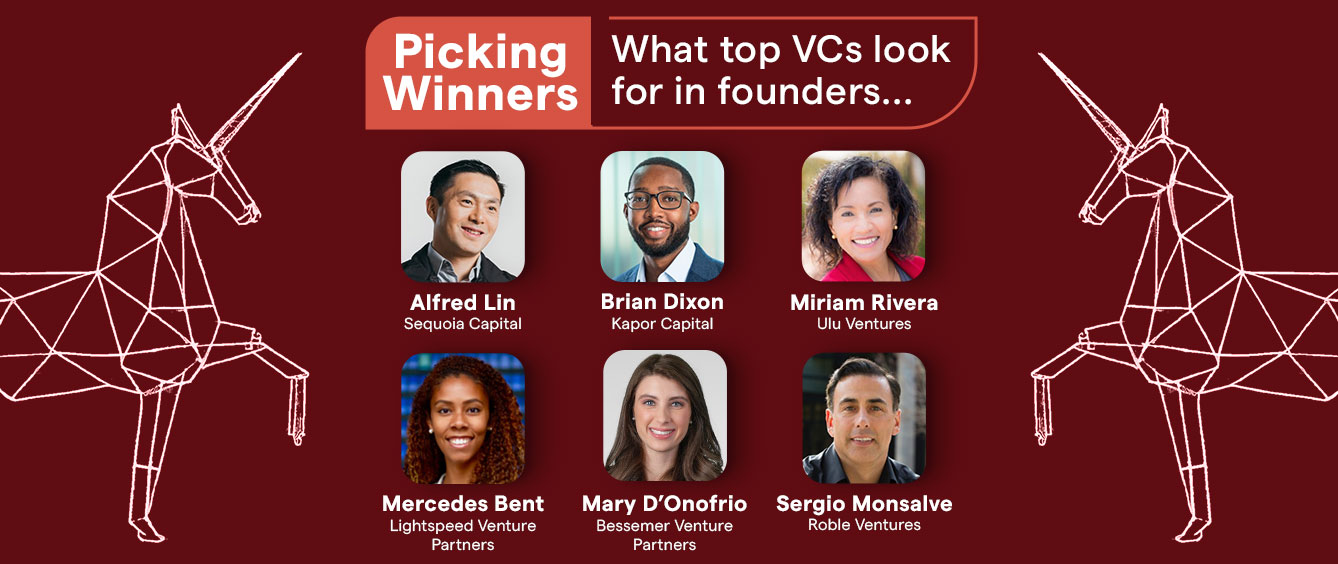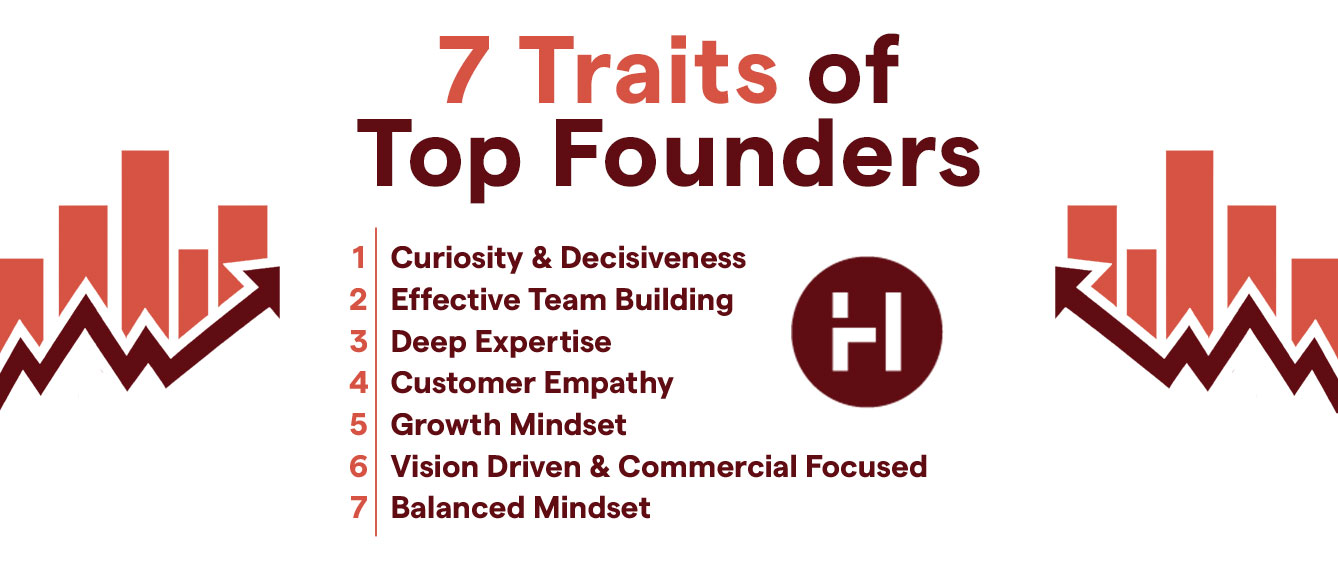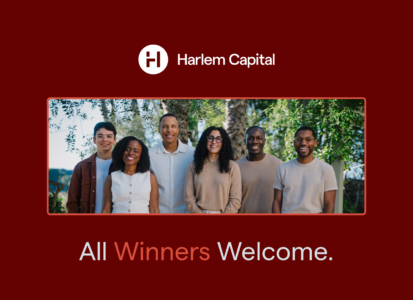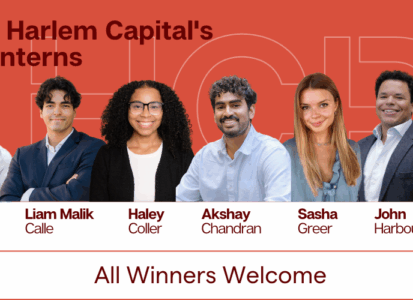Picking Winners: What Top VCs Look For in Founders
by Harlem Capital
By Jarrid Tingle, Gabriela Forter (Summer Intern 2022), and Tonna Obaze
When writing a check to a seed stage company, investors know that things may change along the way — the business, the product, maybe even the market. For this reason, many early-stage investors often mention “betting on founders” — the person behind the business.
If picking successful founders is anything like picking stocks, it can’t be easy — but some investors have made a habit of getting it right.

Harlem Capital turned to our ecosystem with a single question — What qualities make a winning founder?
We reached out to investors who picked founders at the seed stage before their companies scaled to unicorn status. Representing six unique funds, these investors shared seven qualities that are most important in a successful founder.
The answer — An Ivy league degree? FAANG on their resume? Technical Background? Not at all. In fact, we found there’s no one archetype for a great founder, but rather several key qualities that great founders embody.

1. Curiosity & Decisiveness
Sergio Monalve from Roble Ventures emphasized the three key qualities he looks for in a founder are “curiosity, courage and purpose.”
Founders must desire to do things differently, not just better. Through a mindset of curiosity, entrepreneurs identify opportunities to create change and drive disruption. They use their curiosity to drive product development and customer research, collecting information through reading, listening, and talking to other people. But ultimately, founders must reflect — and make their own decisions.
As Mercedes Bent from Lightspeed put it, founders should be “learning animals” and strategic thinkers, thinking 3 or 4 steps ahead. This quality is the precursor for the following founder requirements: being self aware, adaptable, and customer and product-obsessed.
When Sergio is determining if a founder will be a good CEO, he asks them to share a time they’ve made difficult decisions under distress and the process they used navigating to the tough situation. Alfred Lin from Sequoia Capital shared, “great founders won’t attack a large company directly, but will instead go about it in a sly way, finding the wedge that a large company may not be addressing. That’s how they can win.”
2. Effective Team Building
Every investor we spoke to touched on a common theme — founders being aware of their strengths and weaknesses and hiring a team to fill the gaps.
“When founders call and ask for help, it’s like hitting the jackpot,” said Mary D’Onofrio a growth investor from Bessemer Venture Partners. It’s important for a founder to be upfront and willing to say, “I’m good at this and not good at that.”
Founders should know when their expertise needs to be augmented, and invest in utilizing resources to do so. As Alfred from Sequoia said, the whole package doesn’t come from the founder, but from the team they build. “If we look at founders we admire most, they spike in one field. The only problem with that is they may not be able to manage a team. While you like someone who spikes, they have to be self-aware enough to build a team to supplement their weaknesses.
Mary shared that great founders identify their spikes and create a founding team that rounds out their skillset. Founders that surround themselves with experts are generally more effective than those that try to handle every problem themselves. In a stark example, Miriam Rivera from Ulu Ventures noted, that even in military environments — survival depends on diversity and creating a team based off of unique skill sets.
Miriam shared that founders sometimes need to get out of their own way, and not let their fear stop them from getting the expertise they need in making their business grow. She said, “hopefully the founder is mindful enough that they will do what it takes to build the company, regardless of whether someone is better than you in some aspect of the business.”
3. Deep Expertise
Whether they are an insider or an outsider, a veteran or first-time founder — successful entrepreneurs must have deep expertise in their area.
Over the years, founders have gotten great at pitches, but one way the investors are gauging expertise is by looking for novel insights and a unique point of view. Mercedes shared that she looks for founders with an “X-Factor,” which is a superpower that this founder has that no one else does.
If you’re average at everything, as a business or as an individual, then you’re not great at anything, so it’s important to grow a well-rounded team and deep expertise in an area.
Alfred spoke to us about “dynamo” founders — the ones who come from left field, become very interested in a category, go deep and are willing to disrupt the space and be change makers. They have a “secret sauce” and will use their resources and network to the fullest.
Miriam echoed similar sentiments, sharing that founders should demonstrate a “high degree of excellence” and expertise, in addition to overcoming some adversity.
4. Customer Empathy
When it comes to red flags, Sergio shared: “When CEOs don’t light up about their product or customer, it’s a bad sign.”
All the investors highlighted that strong founders have a strong sense of customer empathy. The best founders do more than put themselves in their customers’ shoes — they make sure to walk around in their shoes and internalize their customers’ thought process.
The founder must feel the customer’s pain “viscerally.” Brian Dixon from Kapor Capital emphasizes — founders should have personally experienced the problem, or have insight from a friend or family member who has a “lived experience and should be deeply passionate about the problem they are solving.”
Mercedes and Mary noted they look for founders with a strong alignment to the customer’s voice. Founders should always light up when they talk about the customers they will serve for many years, and be incredibly curious about solving their problems. In addition to being customer-obsessed, the best founders are also product-obsessed.
5. Growth Mindset
Being a founder is not for the faint of heart. It requires strong determination, courage, and a growth mindset. At Harlem Capital, we regularly say: “we would rather be right than consistent” and that’s the same agile mindset we look for in founders.
Founders must constantly be improving and iterating on their product — or else they’ll become obsolete. Sergio shared that he looks for founders who “don’t give up, whether they succeed or fail” while Mercedes shared that she looks for evidence of execution intensity, moving fast and iterating.
Founders start their companies despite all the reasons to say no, but Alfred shared that the best founders succeed by listening to critics acutely. They understand that what got them to today won’t get them to the next stage or series, and they should always be iterating.
Brian shared that founders should never be complacent. “The founders that do well stay close to their customers, have a tight feedback loop, are never satisfied with the product in the market, and have a relentless pursuit to improve.” Even when the product is working, founders should constantly be refining and iterating the product.
Every CEO will make a mistake at some point. They might make a product for the wrong user segment or a bad hire. Mary shared her perspective on “Learnings per Dollar” – the idea that you learn from iteration, but never make the same mistake again. The key is — being able to iterate quickly through market and customer feedback, ensuring the best founders don’t make the same mistake twice.
6. Vision Driven, Commercial Focused
“It’s not about picking missionaries or mercenaries” Alfred shared, but instead about picking founders who have both a purpose and commercial sense.
Missionaries won’t make money and mercenaries will jump to the next thing because they can make more money. Neither alone is good, but together it’s effective. A long enduring company must be commercial, but it won’t stand the test of time without a mission that keeps everyone focused for a decade.
A founder’s ‘why’ should be very clear. For Brian, the founder’s ‘why’ and vision of the company should directly impact the lives of millions in a positive way. For Mercedes, this means that she stays up at night thinking about the founder’s pitch and company vision. For Sergio, a founder should have a strong sense of purpose.
Founders should start with a mission on how they want to change the world, but identify a solution that is commercial enough to be a business. Sergio said, “founders are driven by a purpose — and purpose on top of curiosity and courage gives a team a reason to work really hard to solve a problem and believe in the mission they’re embarking on.” Strong founders see a problem that the world is solving incorrectly and sometimes might even have a chip on their shoulder.
Alfred noted for the best founders — the idea is not just better, but better and different.
Several VCs touched on the importance of how a founder talks about their company. Miriam shared the importance of “telling a good story, motivating others, and articulating what’s special about their business with data.” Elliot Robinson at Bessemer says that “the story can’t tell the numbers, but the numbers can tell the story”.
Founders create an aura that is bigger than themselves and describe it as something larger than its present state. Sharing a bright vision of the future and being a compelling communicator are key.
7. Balanced Mindset
If you visit Alfred’s bio on the Sequoia website, you’ll find a quote — “Dream about the dent you will put in the universe. Stay grounded in your reality. Build a plan that connects these two worlds.”
A common thread investors found among the best founders — they’re dreamers, grounded in reality.
To describe the balanced mindset of successful founders, Alfred turned to F. Scott Fitzgerald:
“The test of first-rate intelligence is the ability to hold two opposing ideas in mind at the same time and still retain the ability to function.”
A founder has to ignore all the no’s at first to start a company, but then listen to all the feedback as they grow their company. They must be a relentless visionary, but also rational and open-minded.
Mercedes said it best when she shared: “Founders should have a balance of being vulnerable and confident.” They need to listen to customer feedback while also offering novelty. There’s no better example than Henry Ford who said, “if I had asked people what they wanted, they would have said faster horses.” The element is not to ignore customers, but instead listen to customers and invent on their behalf.
The balanced mindset of a founder impacts the entire company — because the ability to stay grounded in reality and chart a course forward impacts the whole team.
Conclusion
Seed stage investing is an art, not a science. And in a similar vein, there’s no one size fits all founder.
But if you are a founder that embodies these traits — we’d love to hear from you! Email us or submit to the Harlem Capital pitch form.
And if you’re an investor – next time you find yourself evaluating an early-stage company, keep these seven founder qualities in mind. You can even track your portfolio to see how they impact success down the line.


